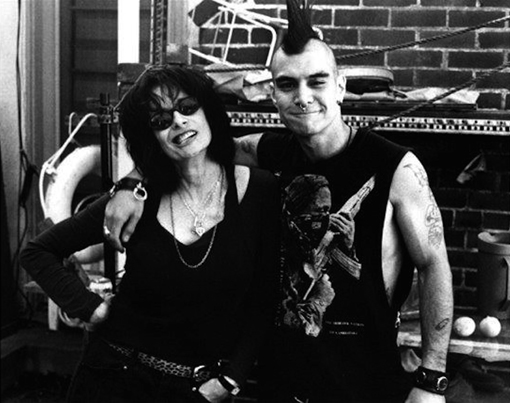The Decline of Western Civilization
Penelope Spheeris’ mammoth trio of documentaries devoted to the alternative rock scene and the lives of young people in Los Angeles, originally released between 1981 and 1998, is now on Blu-ray. Dr Helen Reddington, Senior Lecturer in Music Production at University of East London, feels its pulse.
About the Author: Dr Helen Reddington is currently Senior Lecturer in Music Production at University of East London. During the late 1970s to early 1980s, she was the bassist and lead singer with Brighton-based punk band The Chefs and later, Helen and the Horns. She has written music for film and TV, including Channel 4’s controversial “No One Likes Us, We Don’t Care” about Millwall football club and has been employed by Creative Partnerships as a song writing mentor. Her contributions to publications include The Forgotten Revolution of Female Punk Musicians in the 1970s in Peace Review 16 (2004) and ‘Lady’ Punks in Bands: A Subculturette? in The Post-Subcultures Reader (2004). Her first book The Lost Women of Rock Music: Female Musicians of the Punk Era was published in July 2007.
Penelope Spheeris is an independent-minded director whose work spans documentary, pop video (everything from Queen to Megadeth and Curtis Mayfield), television, and large-scale feature films such as Wayne’s World (1992) and The Beverly Hillbillies (1993). This collection contains her three most anthropological films, The Decline of Western Civilisation parts One, Two and Three, plus a bonus disk, and has been released after her daughter, Alice Fox, encouraged her to delve into the archives and re-release them. Spheeris describes this process as ‘brutal’ and the whole exercise took three years to complete; the release finally appeared in August 2015, and has been well worth the wait.
Part One features LA punks from 1979 to 1980 (including Black Flag, Catholic Discipline, Circle Jerks, Fear, Germs and X), and starts with the members of the bands reading out a standard documentary disclaimer in their own personal style, and with varying degrees of aggression. The documentary sandwiches live renditions of the songs of each band, with music often strongly influenced by the Velvet Underground, between interviews with band members, sometimes backstage and sometimes at ‘home,’ plus other scenesters: venue owners, writers and so on. Wayne Mayotte is one of these, and he describes the punks as having, ‘an abnormal level of adrenaline … the air in Utopia is poisonous.’ Punk has ‘monotone vibes’, according to Mayotte, yet Spheeris captures a colourful and vibrant scene populated by a wide variety of characters: those at the smart end (I noticed a lot of Californian teeth and some very expensive amplification equipment) and those at the rough end, notably Darby Crash whose dental challenges surely rivalled Johnny Rotten’s.
Spheeris has a great eye for detail; as Ron Reyes of Black Flag sings ‘I’m going to boil over today’, the audience boils over on to the stage. Throughout the film she embeds her director’s persona deep inside the subculture. Darby Crash and his girlfriend are at home, cooking a fry-up. The poster on the wall reads ‘Sid Vicious Faces Court’, and a pet tarantula gingerly fingers its way past the plates on the table. Crash is a self-harmer who is also harmed by others (he died of a self-administered heroin overdose in 1980). Spheeris asks the band’s manager, Nicole, if she feels like she wants to quit sometimes. ‘Yes, almost all the time.’ A wry caption later notes that ‘Nicole quit, 1980’. The captions are an additional joy, flagging up the lyrics and running a sparing commentary alongside the action. Spheeris can be subtle; on the stage with Germs was their bass player, Lorna Doom, hidden in the shadows in plain sight but never interviewed. The fanzine element in the subculture was important, and contributors to this part of the scene are also present, including Robert Biggs, owner of Slash Records, who released singles by both Germs and X. X are filmed backstage making barbaric homemade tattoos with a needle and India ink; guitarist Billy Zoom doesn’t want one. He is a clean-cut rockabilly guitarist who can wiggle his ears. If up until now you have doubted Spheeris’ ability to gain the trust of her subjects, this is the point at which you realize that you were wrong. Getting a punk guitarist to wiggle their ears in a dressing room while the other members of the band are self-harming is an amazing coup. These interviews cross the spectrum of the early LA punk scene: witty, druggy, dumb, spanning the field from pop star wannabes to the desperate, and I recognize this version of punk from Britain in the 1970s.
Part Two is very different, although superficially very similar. It bears the guiding hand of Miles Copeland’s I.R.S. and I imagine this documentary was seen as a commercial vehicle for Aerosmith, Lemmy, Alice Cooper and Kiss. Just as in Part One, the artists read out the disclaimer, and then the vehicle veers off course as the sex part of sex and drugs and rock’n’roll comes to the forefront, battling with the crowing ‘businessmen with guitars’ theme. Spheeris asks for a demonstration of headbanging, and the band Lizzy Borden oblige, shaking their big hair in unison like automated soft toys.

Images courtesy of Second Sight Films
It is Rikki Rockett of Poison who does the genre the biggest disservice; and during the interview with band members, Spheeris is heard to remark, ‘You look like an accountant’. A running thread throughout is Ozzy Osbourne in the kitchen with a frying pan, in an echo of the Darby Crash sequence in the previous film. Rather than being swathed in posed groupies, or leering in a lingerie shop (members of Kiss), or boasting about easy conquests (members of Aerosmith), Osbourne’s puzzled take on life unfolds during the preparation and cooking of scrambled eggs. Lemmy also provides a more down to earth touch; asked if he minds bands copying Motorhead after a section on plagiarism (cue much affront from the glammier of the bands), he wryly remarks, ‘Maybe they’ll do something we can copy later’. There are many funny touches here: the guy in a dress and lipstick and yes, that big hair, who complains that “My Mom used to think I was a transvestite.’ After a particularly revolting sexual bragging section in which the fleecing of groupies for clothes, food and even flyers is extolled as a virtue, Spheeris asks if the band members are actually prostitutes. I don’t think they heard the question, although later a member of the band London remarks ‘Our dicks go hard for a gold card’. Alice Cooper, who appears surprisingly prim during the earlier part of the film, poses with a rope noose later on; Spheeris basically lets the bands and their audience (supposed to be so important, but in fact, a farm for groupies), hoist themselves on their own petards. Yes, Spheeris has a marked sense of humour, yet she retains a huge affection for her subjects and later toured with a reformed Black Sabbath, documenting their performances in stadium venues as part of Ozzfest (http://penelopespheeris.com).
Part Three, set in 1996 and 1997, is a different shade of dark. Again, the disclaimer is spat out by various lead singers at gigs, and we see a young audience queuing up outside a venue with several carbon copy versions of Soo Catwoman, amongst a crowd of crusty punks. One of the threads in this film is the character Why-me? Who is a photogenic young man born in 1980, and obviously ‘therapised’, saying about punk: “I wasn’t born, but I own it’. This film features Final Conflict, Litmus Green, Naked Aggression and The Resistance, and just as the influence of punk on the Glam Metal bands can be heard in Part Two, the influence of the Glam Metal bands on neo-punk can be heard in Part Three. The musical continuity is very interesting, although this documentary really focuses most, of the three of them, on the associated subculture. The dance floor is given over to slam-dancing: disobedience has returned. Whereas in Part Two we saw the audience in rapt admiration of the pop-star musicians, here we see the audience much more in control. We visit Keith Morris from Circle Jerks, who featured in Part One, now sporting dreads. ‘The punk rock thing was never a beautiful thing’, he tells us, and Rick Vex from the Mau Mau’s appears almost as a cautionary persona, his hair still fiery but his face gaunt and haunted, and yes, these young people have a desperation in their faces that wasn’t present in parts one and two. We see composite sequences of interview snippets, focused on concepts like ‘everything sucks’ and ‘belonging and not-belonging’. These are surprisingly tender portraits, and one section in particular that centred on abuse reduced me to tears. Twenty years later, the attitude of the audience has subtly changed in line with societal shifts; there is an acknowledgement of queer politics, there are more black punks in the crowd, and the emphasis is on fighting and survival, not sex. Yet Kirsten Patches, of Naked Aggression and who plays a mean French Horn (see ‘wiggling ears’), describes the overt left-wing political engagement of the band, who donate money from their gigs to causes such as a rape crisis centre and AIDS research. Busloads of campaigning punks turn up at demonstrations, much to the surprise of the original demonstrators, in stark contrast to the beer-and-vomiting stories told by other members of the subculture, who survive by squatting, stealing or begging (‘I call it “asking” protests Why-Me?). Spheeris documents detailed and harrowing tales of police and parental brutality that are a million miles from the smug sleaze articulated by the interviewees in Part Two, those rendered mute by money.
These documentaries are a fascinating and honest journey through twenty years of LA music making and subculture, from the underdogs to the overlords and back. Spheeris is a gentle, probing genius of a director; the content has a depth that will please train-spotters, yet will still entertain music fans. As for the bonus disk: three minutes in, I couldn’t bear the return of the big-haired glam metallers, and I pressed ‘eject.’
Dr Helen Reddington

Images courtesy of Second Sight Films
 Learning on Screen
Learning on Screen